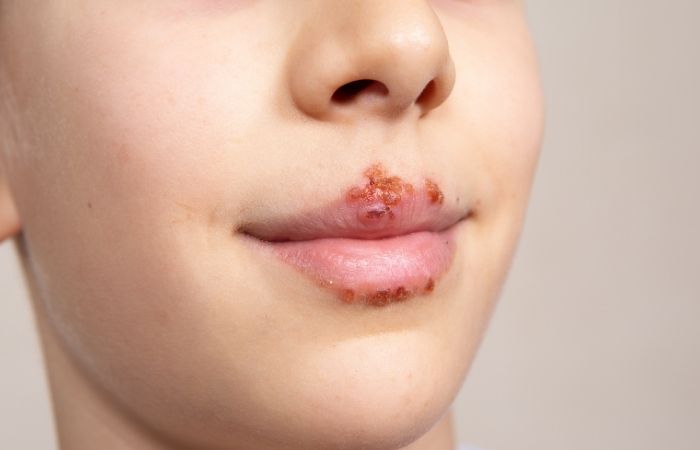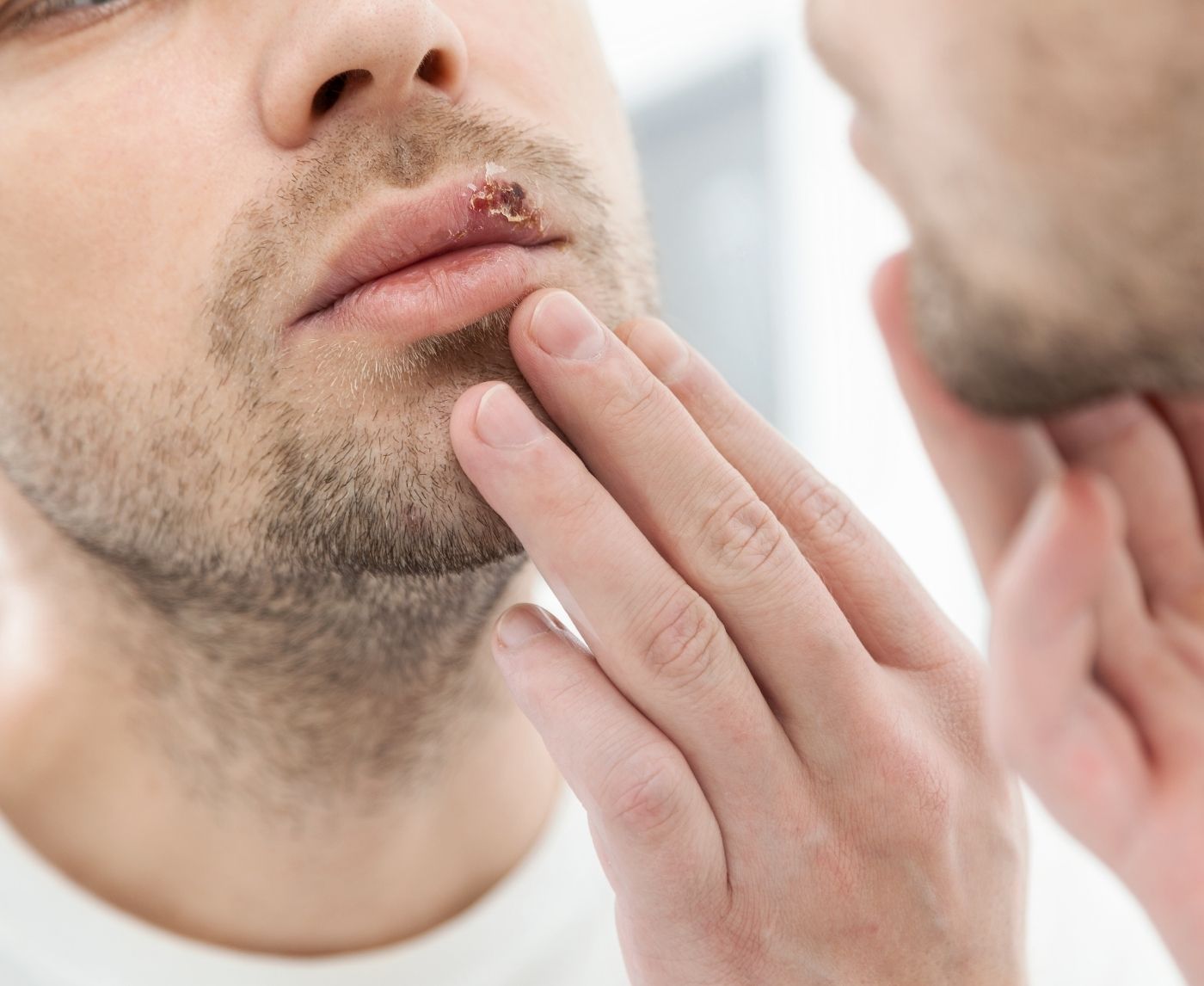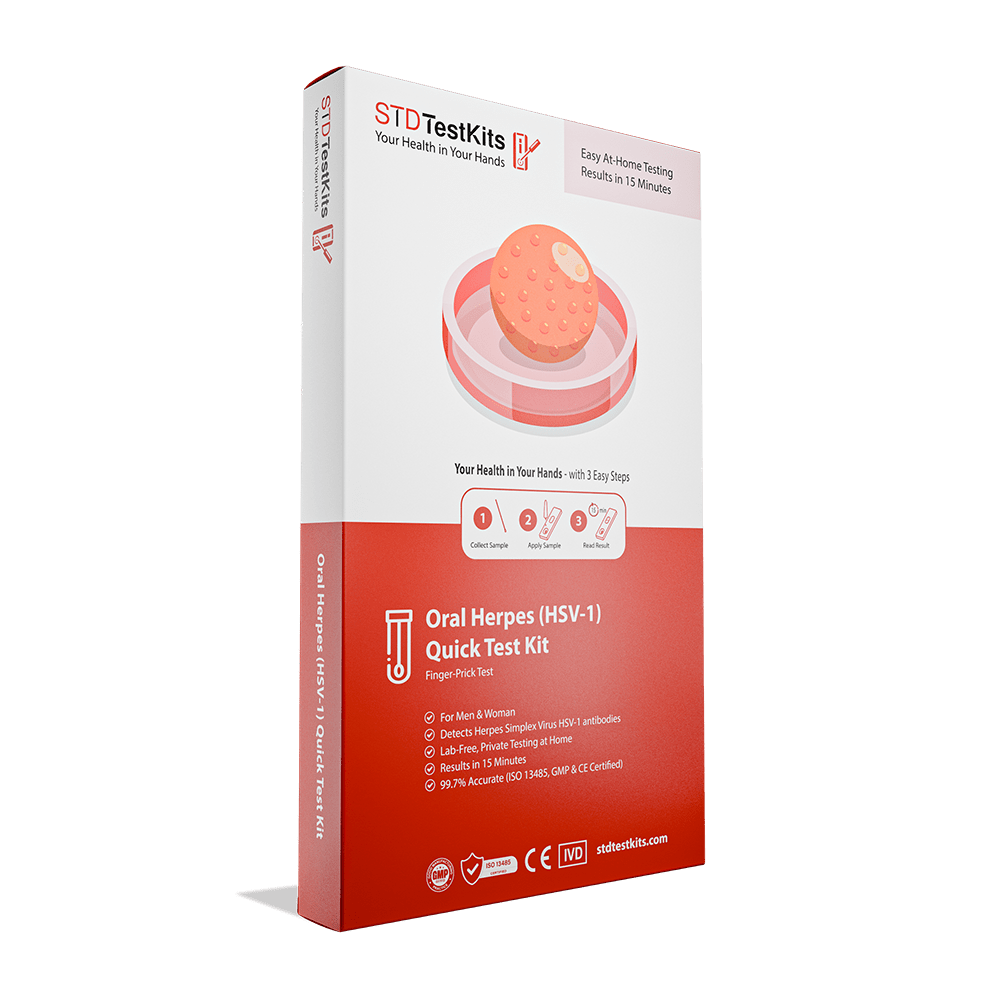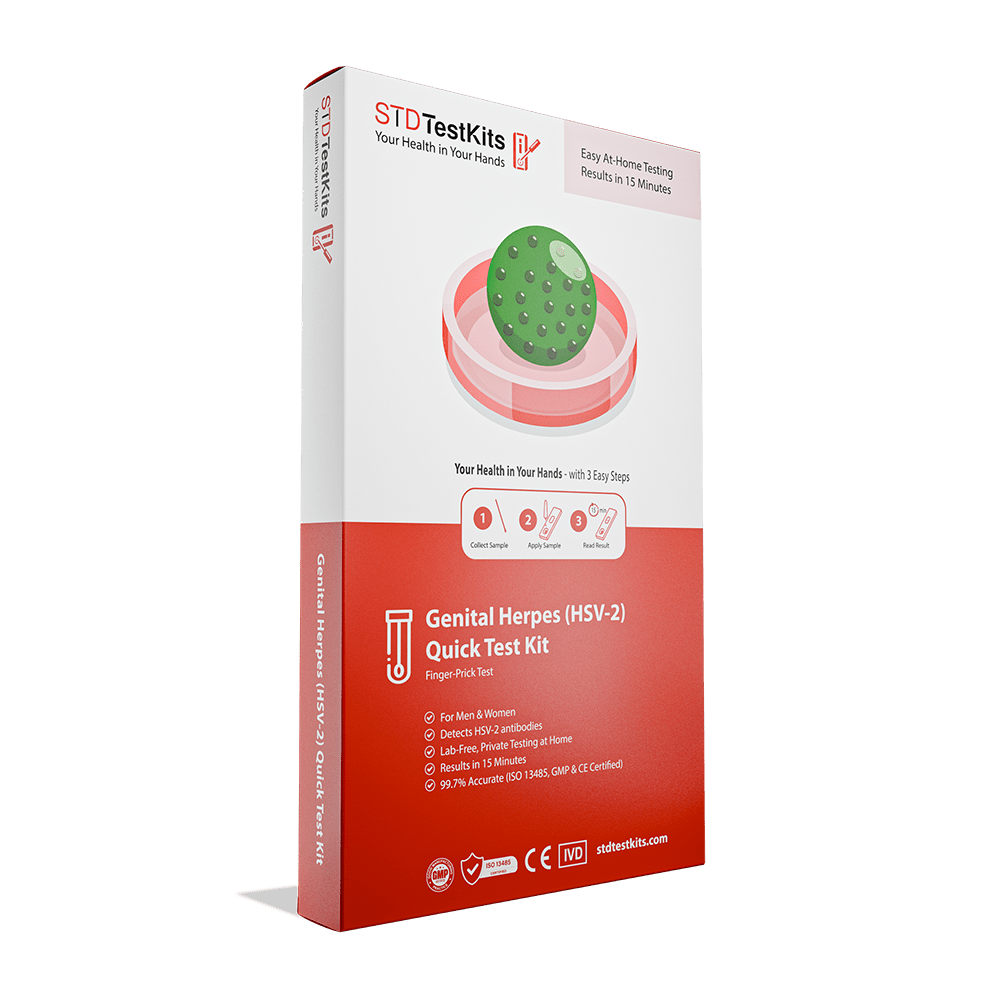You Can Get Chlamydia in the Mouth
Quick Answer: Yes, HSV-1 (commonly called “cold sore virus”) can cause genital herpes, and HSV-2 can infect the mouth, especially through oral sex. The only way to know for sure is through testing, not location alone.
When a Sore Doesn't Show Up Where You Expect
Most people grow up hearing that cold sores mean HSV-1 and genital herpes means HSV-2. But that oversimplified myth is why so many people miss, or misdiagnose, their first outbreak. Today, nearly half of all new genital herpes cases are actually caused by HSV-1, not HSV-2.
Let’s break it down in real-life terms. Maybe you had a hookup last week. It was oral only, no penetration, so you felt safe. Then a few days later, a red bump appears near your genitals. You Google “razor burn” or “STD bump or pimple” at 2AM. It doesn’t hurt much, but it won’t go away either. You’re confused. That’s because the location doesn’t always match the virus type anymore.
HSV-1 is commonly transmitted through kissing, sharing utensils, or oral sex, but it can also cause genital infections. Likewise, HSV-2, while more often genital, can be passed to the mouth during oral sex, especially during a first outbreak. It’s rare, but real. And more people are learning that the hard way.

People are also reading: You Can Now Test for Herpes in Your Bedroom! (Here’s How It Works)
HSV-1 vs HSV-2: Not About Where, But How
So what actually distinguishes HSV-1 from HSV-2? Clinically, they’re nearly identical. Both can cause tingling, burning, painful sores. Both can be passed even when you don’t see a sore. The difference lies mostly in transmission trends, recurrence rates, and shedding patterns, not symptoms.
Figure 1. HSV-1 and HSV-2 differences in transmission, symptoms, and location, based on CDC and Mayo Clinic findings.
Many people first encounter herpes through HSV-1 as children or teens, picking it up through a family member’s kiss or sharing drinks. It lies dormant in nerve cells, often reactivating later during stress or illness. But when oral sex enters the picture, HSV-1 can become a genital issue, and most people don’t know they’re infectious even without an active sore.
Likewise, HSV-2 isn’t “immune” from jumping to your face. Though rarer, documented cases of oral HSV-2 exist, especially in people with weakened immune systems or during a partner’s first outbreak, when viral shedding is highest.
It’s Not Just You: Why This Is Happening More
There’s a reason this question keeps showing up on forums, Reddit threads, and late-night Google searches. The data has shifted. According to a recent global study published in the journal Sexually Transmitted Infections, more than 140 million people worldwide now carry genital HSV-1, not HSV-2. That number has more than doubled in the past two decades.
So why the spike?
Two reasons:
First, the rise of oral sex as a “safer” alternative has led many teens and adults to underestimate its STI risks. Second, increased access to casual dating via apps has amplified transmission opportunities. This isn’t about fear, it’s about facts. And the fact is: any skin-to-skin contact with a shedding virus can transmit herpes, even if you feel “clean” or only had oral contact.
“We see patients all the time who say, ‘But I never had intercourse,’” notes Dr. Melissa Gunter, an infectious disease physician in Atlanta. “They had oral sex, or their partner had a cold sore, and weeks later they’re dealing with genital HSV-1. It’s incredibly common, and often missed because people don’t test unless symptoms scream at them.”
“I Thought It Was a Cold Sore, Until It Wasn’t”
Sophia, 27, had a cold sore during finals week. She always got them under stress. It scabbed over, healed quickly, no big deal. A few days later, she went down on a new partner. Two weeks later, he called her in a panic, he’d developed painful blisters on his penis.
“He asked if I knew I had herpes,” she said. “And I said, ‘What? No, I just get cold sores.’ I didn’t realize that was the same thing.”
That moment, when two people with different understandings of herpes collide, is happening everywhere. And the shame spiral that follows can be devastating. But here’s the truth:
A cold sore is herpes. If it’s caused by HSV-1, it’s still herpes. And yes, it can spread to the genitals through oral sex. What complicates matters is that many people never get tested unless symptoms show up below the belt. They don’t think of HSV-1 as an STD, even though it absolutely can be.
That’s why relying on location instead of testing is one of the most dangerous myths around herpes diagnosis.
Can You Really Tell Which Herpes You Have Just by Symptoms?
Short answer? No. Not with any real confidence. Both HSV-1 and HSV-2 cause almost identical early symptoms: tingling, itching, localized pain, fluid-filled blisters, crusting, and eventual healing within 1–2 weeks. Some people get swollen lymph nodes or flu-like symptoms. Some don’t. Some people never show symptoms at all.
The biggest myth is this: “If it’s on your mouth, it’s HSV-1. If it’s below, it’s HSV-2.”
That used to be more true, decades ago. Today, it’s unreliable at best and misleading at worst. Here’s how symptom overlap breaks down:
Figure 2. Symptom comparison across HSV types and locations, sourced from Mayo Clinic and WHO guidance.
So how do you know which type you actually have?
Only with a type-specific herpes test. This can be done via PCR swab during an outbreak or through an IgG blood test (after the body has produced detectable antibodies, usually a few weeks post-infection). But not all clinics automatically type your result. You need to ask. And not all at-home kits distinguish between HSV-1 and HSV-2 either.
Still, getting tested, even without symptoms, is often the only way to take the mystery (and anxiety) out of what’s going on with your body.
Why Your First Outbreak Might Not Be From Your “Last” Partner
Another common heartbreak in herpes transmission comes from what seems like betrayal. A person gets a sore days after sleeping with someone new and assumes they were “given” herpes by that person. Sometimes that’s true. But sometimes, they were already carrying the virus for months, or years, without symptoms. The new partner simply triggered the first visible outbreak.
Herpes latency is real. The virus can live dormant in nerve cells for decades. According to the CDC, up to 87% of people with HSV-2 don’t know they have it. The number is similar for HSV-1, especially when genital. So when someone finally shows symptoms, it’s not always about “who gave what to whom”, it’s about when the virus decided to show up.
This matters for both relationships and mental health. Testing can help clarify timelines. More importantly, it can help reduce the blame game. No one deserves to carry that weight, especially with something so common and often silent.
In fact, herpes isn’t even considered a “reportable disease” in most U.S. states. It’s medically manageable, socially stigmatized, and emotionally misunderstood. That’s a brutal combination, but one we can fight with information.

People are also reading: Just Started Seeing Someone? You Might Have an STD
Testing After Symptoms: What to Know and When to Go
If you’ve had a sore, mouth or genital, that you’re not sure about, get tested as soon as possible after it appears. The best test at that point is a viral PCR swab, which detects active virus. But timing is everything. If the sore has already scabbed or healed, the virus might be harder to detect from the skin, and a blood test may be your next option.
Blood tests look for antibodies (IgG) to HSV-1 and HSV-2. They’re highly specific, but not great for catching very recent infections, your body needs time to build a response. Most guidelines suggest waiting at least 4 to 6 weeks after potential exposure to get reliable results, though some people may need to retest at 12 weeks for confirmation.
Think of testing like turning on a flashlight. It doesn’t create the problem, it just helps you see what’s already there. And seeing clearly is the first step toward feeling in control again.
Can You Prevent Herpes If You Already Get Cold Sores?
You're not the only one who gets cold sores, especially when you're stressed, in the sun, or when your hormones change. According to the World Health Organization (WHO), up to 67% of people under 50 around the world have HSV-1, mostly because they were exposed to it as children. But a lot of people don't know that you can pass on oral HSV-1 even if you don't have an outbreak.
Yes, even if you feel fine. Even if it’s “been years.” Even if you use mouthwash first. The virus sheds intermittently and invisibly. And while condoms can lower risk, they don’t fully protect against herpes because it spreads through skin-to-skin contact in areas that condoms don’t cover.
- That said, knowledge is power. You can absolutely reduce your chances of spreading or acquiring herpes by combining the following strategies:
- Avoid giving oral sex when you feel a cold sore coming on, or during an active outbreak.
- Talk to your partner about testing, even if you think it’s “just cold sores.”
- Consider suppressive antiviral therapy (like acyclovir or valacyclovir) if you have frequent outbreaks or want to reduce transmission risk.
- Get tested if you’re unsure what type you have. Many people assume, but don’t know.
And if you’re in the dark right now, wondering what that sore meant or if your past partner ever really knew, there’s one place to start.
How to Talk to a Partner, Without Shame or Panic
One of the hardest parts of navigating herpes isn’t the symptoms. It’s the silence.
After Evan tested positive for genital HSV-1, he didn’t tell anyone for months, not even his recent partners.
“I didn’t know how to say it. I kept thinking they’d never touch me again.”
But when he finally told someone he’d started dating, she surprised him. “She said she had cold sores too. She didn’t even flinch. She thanked me for telling her.”
This is more common than you’d think. Because herpes is common. Because people with herpes have normal, happy, safe, amazing sex lives every day. And because honesty, especially when it comes with context, is rarely met with cruelty. The stigma is heavy, but it doesn’t have to be yours to carry forever.
If you’re preparing to talk to someone about your herpes status, here’s what research and real-life conversations suggest:
- Start with the facts. Talk about the differences between HSV-1 and HSV-2 and how either type can affect the mouth or genitals.
- Speak clearly and calmly. "I wanted to tell you something that has to do with my sexual health." "I have HSV-1, which gives me cold sores and can be passed on through oral sex. I wanted you to know that I want us both to be safe."
- Give them tools. Tell them to look at reliable medical sites like the CDC or even this article.
- Ask for questions. You don't need to know everything, but being open builds trust.
- Keep in mind that disclosure is not a punishment. It's a strong, sex-positive way to show you care about yourself and the people you are close to.
Remember: disclosure isn’t a punishment. It’s a powerful, sex-positive act of care, for yourself and the people you share intimacy with.
“But No One Told Me This Could Happen”
Many people who test positive for genital HSV-1 (or oral HSV-2) feel blindsided, not just by the diagnosis, but by the lack of education that led them there. Sexual health education often ignores the nuances of herpes. The messaging tends to split it into two camps: “harmless cold sore” or “genital STD.” And that binary leaves people unprepared.
But the virus doesn’t care where it shows up. It’s a skin-to-skin transmitted infection that adapts to human intimacy. It isn’t a moral failing, and it isn’t a life sentence. It’s a manageable condition. And with more awareness, fewer people will be caught off guard.
The shift is already happening. Online support communities, TikTok educators, sex-positive clinics, and trauma-informed care providers are rewriting the herpes script. They’re teaching people that HSV-1 and HSV-2 are not warnings to avoid sex, but reminders to have informed, consensual, caring sex.
Living With Herpes: What Helps and What Doesn’t
If you’ve just been diagnosed, or if you’ve had herpes for years and still feel some shame, you’re not broken. You’re not dirty. And you’re definitely not alone. What you’re experiencing is the result of decades of misinformation and stigma, not the result of “doing something wrong.”
From a clinical perspective, most herpes cases don’t require ongoing treatment unless symptoms are frequent or distressing. Antivirals are available and affordable. Outbreaks usually lessen over time. And transmission can be managed.
What matters just as much is emotional support. Joining a private herpes support group (online or local), talking to a therapist, or simply reading stories from others can break the isolation. So can taking that first step toward clarity, like testing or telling a partner.
Herpes thrives in secrecy. But once it’s out in the open, its power fades. It becomes just one part of your sexual health, not the whole story.
FAQs
1. Can you really get genital herpes from a cold sore?
Yep, that’s actually one of the most common ways people get genital HSV-1. All it takes is one partner with a cold sore giving oral sex, no symptoms needed, no intercourse required. It's not about being reckless. It's about not knowing what your mouth might be carrying.
2. Wait, so genital herpes can show up on my face?
It can, but it’s not super common. HSV-2 prefers the genitals, but it can infect the mouth, especially if you go down on someone during their outbreak. Most oral herpes is HSV-1, but if you’re noticing new mouth sores and recently had oral-genital contact, it’s worth getting tested just to know.
3. How am I supposed to know which one I have if they look the same?
Great question, and one of the biggest reasons herpes is so confusing. The only reliable way to tell is with a type-specific test. A sore on your lip doesn’t always mean HSV-1. A blister on your genitals doesn’t always mean HSV-2. Location helps, but testing is the truth-teller here.
4. I’ve had cold sores my whole life. Does that mean I have an STD?
Not necessarily. Oral HSV-1 is usually passed in childhood from innocent things like family kisses or shared cups. But once you’re sexually active, yes, it becomes a potential STD if you give oral sex. It’s not about shame. It’s about awareness, consent, and protecting your partners.
5. Can I get herpes if I never had “real” sex?
Absolutely. Herpes doesn’t need penetration to party. It spreads through skin-to-skin contact, and that includes oral sex, grinding, even just intimate rubbing if someone’s shedding the virus. Lots of people get their first outbreak without ever having what they’d consider “sex.”
6. Do I always have to have an outbreak to be contagious?
Unfortunately, no. Herpes likes to lurk. Even when you feel fine, the virus can shed from your skin. That’s why it’s possible to pass it without realizing, and why condoms lower the risk but don’t eliminate it entirely.
7. How long should I wait to test if I think I was exposed?
If you’ve got a visible sore, test ASAP with a swab, that's your best bet. If not, wait 4–6 weeks for an accurate blood test. Some folks retest at 12 weeks for backup. The waiting game is rough, but testing too soon can miss the antibodies entirely.
8. Do these home herpes test kits actually work?
They do, as long as you follow the instructions. Most at-home kits use a finger-prick blood sample to detect antibodies. Just make sure the one you choose tells you whether it tests for both HSV-1 and HSV-2, not just “herpes” in general. The good ones will.
9. Will I be stuck with painful outbreaks forever?
For most people, no. The first outbreak is usually the worst. After that, your body starts fighting back. Some folks never have another. Others get occasional flares, often triggered by stress or illness. Antiviral meds can help keep things quiet if it becomes a regular visitor.
10. Can I still date, have sex, fall in love… all of it?
Hell yes. Herpes doesn’t cancel your sex life or your relationship status. It just means being honest, being informed, and maybe adjusting some habits. Plenty of people have herpes and fulfilling, spicy, beautiful love lives. You don’t have to settle, shrink, or stop.
You Deserve Answers, Not Assumptions
You care, not just because you're interested. You need to listen to what your body is telling you. You want to know the truth instead of being scared, and you want to connect with others without feeling bad. That takes a lot of courage. And knowledgeable.
Having herpes, whether it's HSV-1 or HSV-2, oral or genital, doesn't mean you're dirty or careless. It's about being a person. It's about skin, touch, feelings, trust, and closeness. You can have the virus and still deserve love, pleasure, and a partner. You can have great sex even if you have herpes. And you can definitely change the story with one small, empowering step: knowing your status.
Don't wait and wonder; get the answers you need. This at-home combo test kit checks for the most common STDs quickly and discreetly.
How We Sourced This Article: We combined current guidance from leading medical organizations with peer-reviewed research and lived-experience reporting to make this guide practical, compassionate, and accurate. In total, around fifteen references informed the writing; below, we’ve highlighted some of the most relevant and reader-friendly sources.
Sources
1. WHO – Herpes Simplex Virus Fact Sheet
2. Planned Parenthood – Herpes Overview
4. Genital Herpes — STI Treatment Guidelines | CDC
5. Herpes Simplex Virus (HSV) | WHO
6. Oral Herpes (HSV-1 & HSV-2) | Johns Hopkins Medicine
About the Author
Dr. F. David, MD is a board-certified infectious disease specialist who works to stop, diagnose, and treat STIs. He is dedicated to making his work available to more people, whether they live in cities or off the grid. He combines clinical accuracy with a straightforward, sex-positive approach.
Reviewed by: A. Marquez, RN, MPH | Last medically reviewed: October 2025







